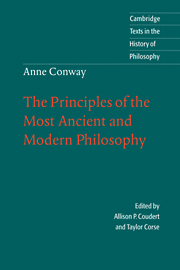Book contents
- Frontmatter
- Contents
- Acknowledgments
- Introduction
- Chronology
- Further reading
- Note on the text
- The Principles of the Most Ancient and Modern Philosophy
- Unpublished Preface by Henry More
- Published Preface
- Chapter I
- Chapter II
- Chapter III
- Chapter IV
- Chapter V
- Chapter VI
- Chapter VII
- Chapter VIII
- Chapter IX
- Index
- Cambridge Texts in the History of Philosophy
Chapter IV
Published online by Cambridge University Press: 18 November 2009
- Frontmatter
- Contents
- Acknowledgments
- Introduction
- Chronology
- Further reading
- Note on the text
- The Principles of the Most Ancient and Modern Philosophy
- Unpublished Preface by Henry More
- Published Preface
- Chapter I
- Chapter II
- Chapter III
- Chapter IV
- Chapter V
- Chapter VI
- Chapter VII
- Chapter VIII
- Chapter IX
- Index
- Cambridge Texts in the History of Philosophy
Summary
S. 1. Whether God created all creatures at the same time or successively. S. 2. That all things are contained in Christ, the man, and have their essential being in him. S. 3. That Christ is, insofar as he is man, the first born of all creatures. S. 4. That no creature can ever attain equality with him.
S. 1. From what has been said above, this perplexing question can easily be answered, namely whether God created all creatures at the same time or one after the other? For, if the word “to create” refers to God himself or to an internal decree of his will, then creation occurred all at one time. But if “to create” refers to the creatures, then it occurred successively over time. For just as it is the nature and essential attribute of God to be immutable and eternal, so it is the nature of his creatures to be mutable and temporal. Finally, if the word “to create” refers to the universal seeds and principles, which are like springs and fountains from which creatures flow forth in an orderly succession determined by God (who is the greatest and first principle of all things), then it can also be said that all creatures were created at the same time, especially if one considers the Messiah or Christ, who is the first born of all creatures, through whom all things are said to have been made, as John declares, and as Paul expressly affirms, “through Christ all things visible and invisible have been made” (Colossians 1:16).
- Type
- Chapter
- Information
- Publisher: Cambridge University PressPrint publication year: 1996

